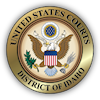 WEDNESDAY, JULY 09, 2025
WEDNESDAY, JULY 09, 2025 IMAGE: "Sawtooth National Forest - Stanley, Idaho"
UNITED STATES COURTS
District of Idaho
Clerk of Court Stephen W. Kenyon
Public 2 New

 WEDNESDAY, JULY 09, 2025
WEDNESDAY, JULY 09, 2025 The clerk of court is an officer of the federal district court appointed by the court's Judges and serves as the chief executive officer. The clerk oversees the court's administration, especially managing the flow of cases through the court and all of its non-judicial functions.
The clerk of court and clerk's office staff play many vital roles; sometimes the office is referred to as the nerve center of the court (FJC 2014). Clerk's office functions include, but are not limited to: